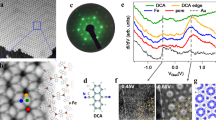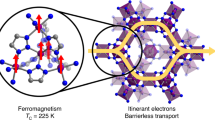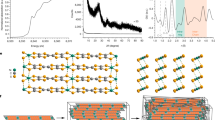Abstract
Low-dimensional, especially one-dimensional (1D), organic compounds are known to exhibit the properties of semiconductors, molecular metals and superconductors1. The theoretical prediction of 1D organic ferromagnets and the principles of construction of polymer polyradicals with a ground state spin proportional to a number of monomeric units were proposed in 1977–782,3. For nearly two decades various hydrocarbons of high spin multiplicity have been studied as the model of an organic ferromagnet4–6. Advanced quantum chemistry techniques have been applied for theoretical investigations of the electronic structure of such compounds7–9. Here we present a study of an organic polymer ferromagnetic preparation with a transition metal impurity content well below the level likely to significantly affect its magnetic properties. We find that all the organic polymer ferromagnet samples can be conditionally subdivided into three groups: paramagnetic polymers7–9, spin glasses10 and real polymer ferromagnets.
This is a preview of subscription content, access via your institution
Access options
Subscribe to this journal
Receive 51 print issues and online access
$199.00 per year
only $3.90 per issue
Buy this article
- Purchase on Springer Link
- Instant access to full article PDF
Prices may be subject to local taxes which are calculated during checkout
Similar content being viewed by others
References
Miller, J. Extended Linear Chain Compounds Vols 1–3 (Plenum, New York, 1983).
Ovchinnikov, A. A. Dokl. (Proc.) Acad. Sci. USSR 236, 928–931 (1977).
Ovchinnikov, A. A. Theor. chim. Acta 47, 297–303 (1978).
Ovchinnikov, A. A. & Cheranovskii, V. O. Teor. éksp. Khim. 17, 1010–1018 (1981).
Tyutyulkov, N. N., Polansky, O. E., Schuster, P., Karabunarliev, S. & Ivanov, C. J. Theor. chim. Acta, 67, 211–228 (1985).
Nasu, K. Phys. Rev. B33, 330–338 (1986).
Jtoh, K. Chem. Phys. Lett. 1, 235–238 (1967).
Jtoh, K. Pure appl. Chem. 50, 1251–1259 (1978).
Teki, Y., Takui, T., Jtoh, K., Jwamura, H., Kobayashi, K. J. Am. chem. Soc. 108, 2147–2156 (1986).
Korshak, Yu. V., Ovchinnikov, A. A., Shapiro, A. M., Medvedeva, T. V. & Spector, V. N. Zh. éksp. teor. Fiz. Pis̀ima, 43, 309–311 (1986).
Baughman, R. H. J. Polym. Sci. 12, 1511–1536 (1974).
Korshak, Yu. V., Ovchinnikov, A. A., Shapiro, A. M., Medvedeva, T. V. & Spector, V. N. Abstr. int. Conf. Sci. Technol synthetic Metals, Kyoto (1986).
Bloor, D., Ando, D. I., Fisher, D. A. & Hubble, C. L. in Molecular Metals (ed. Hatfield, W. E.) 249 (Plenum, New York, 1979).
Kerrington, A. & McLanchlan, K. A. Magnetic Resonance and its Chemical Applications (Harper & Row, New York and Evanstone, London, 1967).
Author information
Authors and Affiliations
Rights and permissions
About this article
Cite this article
Korshak, Y., Medvedeva, T., Ovchinnikov, A. et al. Organic polymer ferromagnet. Nature 326, 370–372 (1987). https://doi.org/10.1038/326370a0
Received:
Accepted:
Issue Date:
DOI: https://doi.org/10.1038/326370a0
This article is cited by
-
Organic magnetoelectric and optomagnetic couplings: perspectives for organic spin optoelectronics
NPG Asia Materials (2021)
-
Open-shell organic semiconductors: an emerging class of materials with novel properties
Polymer Journal (2018)
-
Spin Excitation Under Electron Delocalization of Side Radicals in Quasi-One-Dimensional Organic Ferromagnet
Journal of Electronic Materials (2017)
-
Towards Rectifying Performance at the Molecular Scale
Topics in Current Chemistry (2017)
-
Synthesis, Characterization, Electrical Conductivity and Fluorescence Properties of Polyimine Bearing Phenylacetylene Units
Journal of Fluorescence (2016)
Comments
By submitting a comment you agree to abide by our Terms and Community Guidelines. If you find something abusive or that does not comply with our terms or guidelines please flag it as inappropriate.



